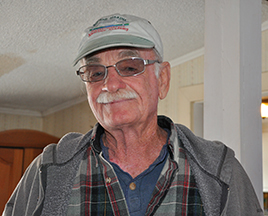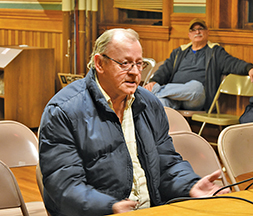By Beth David, Editor
The Fairhaven Board of Public Works is still a tie, and no one has filed to have a recount. Would that we were one of the 35 states that just toss a coin.
Incumbent Robert “Hoppy” Hobson and newcomer to politics Albert Martin both received 338 votes in the April 2 election, tying them for the second seat. Incumbent Keith Silvia received 480 votes.

Robert “Hoppy” Hobson
After the tie was announced, Mr. Hobson joked that they should just toss a coin. But in Massachusetts, that’s not allowed.
In the days after the election, though, it was confusing to figure out what was allowed.
Town Clerk Eileen Lowney asked the state for direction.
In a tie, or a “failure to elect,” a candidate has to ask for a recount. That requires 10 signatures from each of the six precincts, with one signature in each precinct notarized. The deadline for turning in those signatures was 4/12, 10 days after the election.
Mr. Hobson set about getting the signatures.
Meanwhile, he asked Ms. Lowney what would happen if neither candidate asked for recount. She checked with the Secretary of State’s office and told him that the Selectboard and the BPW would vote in a joint meeting.
Meanwhile, she said, Mr. Hobson was still considered a board member and could vote.

Al Martin
So, Mr. Hobson decided not to turn in the papers. He said there was no reason to go to all that trouble and expense, figuring he had a good chance of winning that vote.
He did, however, at one point, ask Ms. Lowney if she should talk to Town Counsel Thomas Crotty, but she declined, saying the state was the authority on the matter.
The day after the deadline passed, Mr. Hobson was informed by Ms. Lowney and Town Administrator Mark Rees that a mistake had been made.
The special act that created the BPW in 1968, specifically states that the Selectboard alone should vote to appoint someone to the position. Subsequent amendments and additional special acts related to the BPW, also state that the Selectboard alone will fill a vacancy on the BPW.
That person will hold the seat until the next local election, which is in 2019. Whoever is appointed will have to run to finish out the unexpired term.
Mr. Hobson was not, and is not, happy.
He said that he met with Ms. Lowney and Mr. Rees, and in the course of that discussion, the suggestion was made that he get an attorney and ask for an extension of the deadline to have the recount.
In a phone interview, Mr. Ress declined to say who alerted him to the existence of the special act regarding the BPW. He did say, however, that when he became aware of it, he contacted Mr. Crotty, who discovered the section that directs the Selectboard to make the decision alone.
Mr. Hobson said he was angry that he got three different stories, causing him to miss the filling deadline for a recount.
He said he believed he had the votes in a joint meeting, so why put the town through the expense and work of a recount?
Mr. Martin said he had no interest in getting a recount. He said he believed the tie would still be a tie, so why go through all that time, trouble and expense.
“Let them choose,” he said, and noted that BPW chairperson Michael Ristuccia announced he would not run for re-election next year, so he and Hoppy would both have a good chance of getting on the board anyway.
As for his chances with the Selectboard, Mr. Martin was non-committal. He said he had not spoken to any of the members.
“But I do know them all,” said Mr. Martin.
He knows Selectboard member Daniel Freitas because he worked in the public works department some years ago; he knows Bob Espindola because of their work on union issues; and he knows Charlie Murphy because he does the town auction, and from various volunteer organizations.
“So, they all know me,” he said.
The question is: “Are they going to go with the incumbent or the new guy?”
Either way, he is happy, he said.
“I tied a long term incumbent,” said Mr. Martin. “Let the higher powers decide.”
Mr. Hobson had not decided if he would go to court to get an extension on the deadline. He said he would be meeting with his lawyer this week to decide.
“So I’ve got to get a lawyer because you people screwed up,” he said he told Mr. Rees and Ms. Lowney in the meting. “And I’ve got to pay a lawyer. Why should I do it? You people screwed up.”
Mr. Hobson said he had no idea how much it would cost to go to court, but he was angry because it was the town’s error.
“It’s the principle of the thing,” he said. “I don’t think it’s fair that I’ve got to go to court because they screwed up.”
He admitted that his chances with the Selectboard alone are not good. He has frequently clashed publicly with Mr. Freitas, going back to their time on the BPW. Their clashes have heated up recently on several occasions.
He gave no insight into how he felt the other two board members would vote.
Mr. Rees said the Selectboard would take up the matter at a meeting soon, but he did not have the date yet. The next meeting is on Monday, 4/23, but the agenda had not been set by press time.
The Special Act requires the board to act within 30 days.
Meanwhile, in other parts of the country, coin tosses have broken ties in many states for a variety of offices.
According to the Washington Post in a 2014 article, 35 states determine tied elections by games of chance. The article was written after an election for a judge in New Mexico was decided by a coin toss that year.
According to a variety of reports, it is quite common in local elections, a little less common in statewide elections. It is “unprecedented” in federal elections, according to the Washington Post article.
The article says that some states are very specific, such as a coin toss in Idaho, and the “names to be written on paper and pulled from a container” in Oklahoma.
In Connecticut, the law was changed in 2007, to stop the coin toss as the way of deciding tied primaries.
An article in the Atlantic in 2012, traces the practice back to ancient Athens.
The article says that nine states had used coin tosses “more recently,” two used card games, and one chose a name from a hat.
Apparently, it is not that rare on the local level in America.
In Kentucky, in 2012, a city commission seat was settled by flipping a coin. A duel is” expressly forbidden” in Kentucky, according to the Atlantic. •••
•••
Support local journalism, donate to the Neighb News at: https://www.paypal.com/cgi-bin/webscr?cmd=_s-xclick&hosted_button_id=Y6V5ARRYH689G
Click here to download the entire 4/12/18 issue: 04-19-18 Limerick



